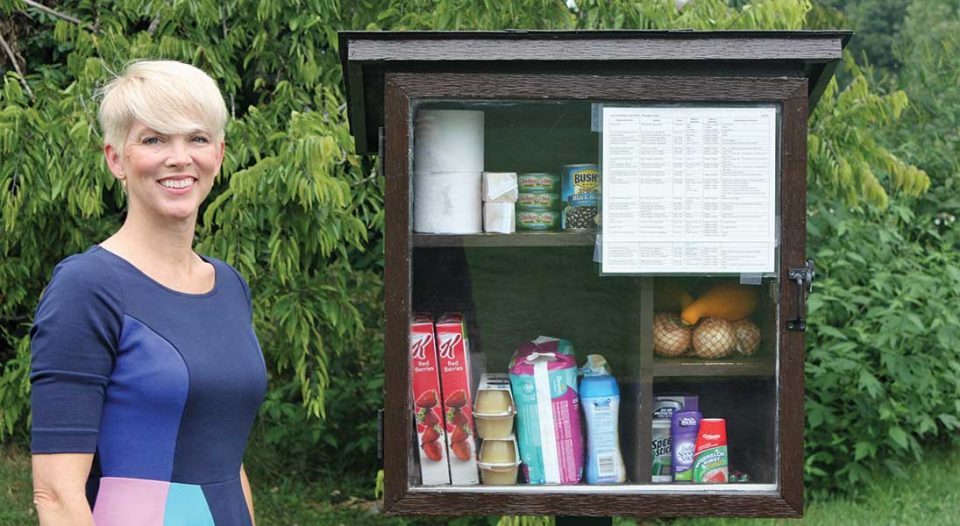Editor’s note: In this article, Peter McLellan, ELCA program director for hunger education, reflects on the 2024 World Hunger Leadership Gathering, held Feb. 1-4 in Houston. The annual event gathers ELCA World Hunger’s leaders for networking, sharing ideas, learning and planning for the church’s shared ministry to address hunger and its root causes in local and global communities.
The 2024 World Hunger Leadership Gathering was my first as a churchwide staff member.  From the outset, I was overwhelmed by the many gifts represented by the ministries and leaders who had gathered during ELCA World Hunger’s 50th year. To be sure, our church body is blessed to have among us experts actively engaging their communities in the ministry of ending hunger at its roots. The depth of each participant’s specific stories only magnified for me the power of ELCA World Hunger’s global impact.
From the outset, I was overwhelmed by the many gifts represented by the ministries and leaders who had gathered during ELCA World Hunger’s 50th year. To be sure, our church body is blessed to have among us experts actively engaging their communities in the ministry of ending hunger at its roots. The depth of each participant’s specific stories only magnified for me the power of ELCA World Hunger’s global impact.
I would like to share the stories of three leaders who had some time to sit with me and discuss their ministries.
Grace Hoening, a student at the University of Evansville (Ind.), is the social media coordinator for FoodRecovery.org, which connects food pantries and nonprofits to restaurants, hotels and other organizations that have excess food. Through an online matchmaking platform and distribution partners, the organization fights hunger by making food accessible and reducing food waste. It is also an ELCA Domestic Hunger Grant partner.
We discussed her obvious gifts for creativity, passion and the courage to be disruptive. “I’ve always been OK being disruptive,” she said. “I have definitely cornered bishops before.”
Hoening’s story and action also echoes much of what we heard from the large contingent of emerging, young adult leaders at the gathering: she is a person of faith, a Lutheran to be sure—and an active World Hunger leader since the age of 15—and her activism occurs outside the programming of a congregation.
Allison Kies is a member of Peace Lutheran Church in Tacoma, Wash., and a hunger leader in the Southwestern Washington Synod. This is a “doer church,” Kies said. “We are a church that does stuff.”
That doing starts with an intimate knowledge of and relationship with the community. Peace, which sees its justice work as part of its everyday global mission, has developed longstanding ministries by identifying challenges in its community: mainly education, the cost of housing and gang violence in the face of rapid gentrification. The congregation has supported a transitional housing program, a meal program and the Peace Community Center (also an ELCA World Hunger partner), which offers mentoring and educational assistance for young folks, kindergarten through 12th grade. The congregation supports their affordable housing ministry with volunteers and paid staff, who connect residents to social and medical services, and collaborates with other local congregations to staff their meal programs.
This is a “doer church. We are a church that does stuff.”
An ELCA World Hunger Big Dream Grant recipient and a partner social ministry organization, Peace’s mission is integral to the success story of World Hunger. Much of this work has simply been part of their community’s story “from the very beginning,” Kies said. But now, she added, the congregation is also looking to an “antiracist” future, the lens through which “we view everything.”
Finally, I caught up with Jessica McClard, a member of Good Shepherd Lutheran Church in Fayetteville, Ark., and the founder of the Little Free Pantry movement. We spent most of our time discussing her work with the pantry, but that doesn’t mean community isn’t infused into all she does. In fact, it was the Little Free Libraries along her local running route that prompted McClard to begin thinking about access—especially access to food.
McClard set up her first Little Free Pantry in May 2016, and by that autumn the movement had gone global. It’s the privacy and dignity combined with the community ethos the pantries afford that McClard appreciates the most. “It feels so collaborative on both sides,” she said, noting that people who use the pantries give as much as they use.
Her ability to witness to the needs in her community and to the success of this ministry’s growth are an uncommon gift to our church and communities. She concluded her story in a most fitting way: “I continue to be astounded by what goes on in an empty box.”
These hunger leaders’ stories showcase just three of the many extraordinary gifts represented at the leadership gathering. We were blessed to gather with disrupters like Hoening, doers like Kies and witnesses like McClard. We are blessed still further by planners, organizers, advocates and preachers.
In short, the hunger leader network isn’t just generous—it is generous with gifts of prophetic, gospel justice. Fifty years on, ELCA World Hunger is not just more diverse in the array of blessings offered by its network, it is stronger for it.
To learn more about how you can become involved in ending hunger, visit elca.org/hunger, download the “ELCA World Hunger’s Action Guide for Congregations” or shop with the ELCA Good Gifts Catalog.




